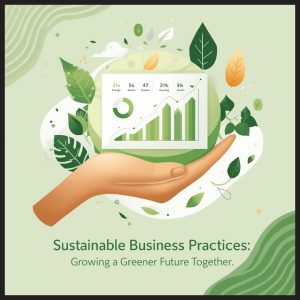Table of Contents
ToggleSustainable Business Practices
In today’s rapidly evolving corporate landscape, sustainable business practices have become the cornerstone of responsible growth and long-term profitability. Companies around the world are realizing that sustainability is no longer just a moral choice—it’s a strategic necessity. Businesses that integrate environmental and social responsibility into their core operations not only strengthen their brand image but also create lasting value for customers, employees, and investors. The shift toward sustainable business practices reflects a growing awareness that the planet’s resources are finite, and that corporate success must go hand in hand with ecological balance and community well-being.

The modern business world faces increasing scrutiny from consumers who demand transparency and ethical conduct. Whether it’s reducing carbon emissions, adopting renewable energy, or ensuring fair labor conditions, sustainability has become a defining factor of competitive advantage. A company that invests in sustainability is investing in its future resilience—by cutting waste, improving efficiency, and reducing risk. From small startups to global corporations, the movement toward sustainable business practices is reshaping how industries operate and how success is measured.
Building the Foundation for Sustainability
Every organization looking to implement sustainable business practices must begin with a clear understanding of its environmental footprint and social impact. This involves assessing how products are sourced, manufactured, distributed, and disposed of. Businesses are increasingly adopting eco-friendly supply chains, prioritizing renewable materials and ethical sourcing to minimize harm to the environment. Transitioning to green manufacturing methods not only reduces pollution but often leads to cost savings through energy efficiency and waste reduction.
One key concept closely linked with sustainability is the circular economy, where resources are reused, repaired, and recycled rather than discarded. This model encourages companies to rethink traditional production and consumption patterns. Instead of the linear “take-make-dispose” approach, businesses are finding ways to extend product lifecycles and minimize resource extraction. The shift to circular operations aligns with corporate environmental responsibility, a principle that urges firms to consider their broader impact on ecosystems and societies.
Another essential pillar is corporate social responsibility (CSR). Beyond environmental factors, CSR encompasses fair wages, community engagement, and ethical governance. When companies support education, promote diversity, and invest in local communities, they contribute to sustainable development. Moreover, such initiatives foster customer loyalty and improve employee morale. Modern consumers prefer brands that align with their values, and CSR-driven companies are better positioned to attract and retain this conscious audience.
Sustainability also requires innovation. Businesses are turning to technology to monitor energy usage, reduce waste, and track carbon footprints. From smart logistics that cut transportation emissions to sustainable product design, technology has become a key enabler of eco-conscious transformation. Many companies are using artificial intelligence and data analytics to identify inefficiencies and predict better sustainability outcomes. By embedding sustainability into the core of business strategy, organizations not only future-proof themselves but also contribute to global goals such as the UN’s Sustainable Development Goals (SDGs).

Economic and Environmental Advantages
Adopting sustainable business practices offers a multitude of benefits that go beyond the ethical dimension. From an economic standpoint, sustainability drives innovation and efficiency. Energy-efficient systems and reduced material waste directly translate into lower operational costs. For example, businesses that invest in renewable energy adoption—such as solar or wind power—reduce dependence on fossil fuels and protect themselves from fluctuating energy prices. In addition, carbon footprint reduction initiatives can lead to significant savings in the long term.
Environmentally, sustainability ensures the conservation of resources for future generations. The use of biodegradable packaging, waste recycling, and water management not only prevents environmental degradation but also aligns companies with global climate goals. Many governments now offer tax incentives and grants for businesses that implement eco-friendly measures. These green incentives for corporations serve as financial motivators for transitioning toward more sustainable models.
Socially, sustainable businesses create positive ripple effects across communities. Ethical labor practices ensure that workers are treated fairly, while local sourcing supports regional economies. Transparency in supply chains helps combat issues like child labor and exploitation, strengthening a company’s ethical standing. Furthermore, engaging in sustainability initiatives can attract socially responsible investors who are increasingly looking for companies with strong Environmental, Social, and Governance (ESG) performance metrics.
Consumers today are also more informed and environmentally conscious. They prefer products that are eco-labeled, cruelty-free, and ethically produced. By implementing sustainable marketing strategies, companies can communicate their values effectively and build brand trust. As a result, sustainable products often enjoy premium pricing, offsetting any initial investment required to transition to greener operations. The long-term return on investment (ROI) of sustainability is substantial, ranging from improved reputation to enhanced operational resilience in the face of global challenges such as climate change and resource scarcity.
Innovation and Green Leadership
Innovation is at the heart of sustainable business practices, driving companies to reimagine how they produce, distribute, and consume goods. The rise of green technology solutions has opened new avenues for reducing waste and optimizing energy use. Businesses are developing smart buildings powered by renewable sources, adopting energy-efficient manufacturing equipment, and using digital platforms to track and report sustainability metrics. These innovations not only contribute to environmental goals but also enhance operational agility and competitiveness.
Leadership plays a pivotal role in shaping sustainability culture. Forward-thinking CEOs and managers are now recognized not only for profit generation but also for their commitment to sustainability. The emergence of sustainability-driven leadership reflects a fundamental shift in corporate governance. Leaders who prioritize long-term ecological and social well-being over short-term gains create organizations that thrive in the modern economy.
The collaboration between businesses, governments, and NGOs is also essential. Public-private partnerships are driving large-scale sustainability projects such as renewable energy infrastructure, sustainable agriculture programs, and waste management systems. This collaborative approach ensures that environmental goals are supported by economic and political frameworks that encourage progress.
One of the emerging concepts gaining traction is green entrepreneurship, where new businesses are founded with sustainability as their central mission. These enterprises often focus on innovative solutions—ranging from zero-waste retail models to eco-conscious transportation networks. They represent the next generation of businesses that prioritize purpose alongside profit.
Digitalization has also accelerated sustainability efforts. Data-driven insights help companies optimize their resource consumption and reduce inefficiencies. For instance, IoT-enabled sensors can monitor emissions, detect leaks, and adjust energy consumption in real time. Through digital sustainability transformation, businesses are merging technology with responsibility, demonstrating that progress and preservation can coexist.
Overcoming Challenges in Implementation
While sustainable business practices offer undeniable advantages, their implementation comes with challenges. One major barrier is cost perception—many companies believe that transitioning to sustainable systems is expensive. However, this misconception often stems from focusing on short-term costs rather than long-term benefits. In reality, sustainability investments pay for themselves over time through resource savings and improved efficiency. The key lies in viewing sustainability not as a cost but as an opportunity.
Another challenge is the complexity of supply chains. Globalization has made it difficult to ensure that every step of the production process adheres to sustainability standards. To address this, businesses are turning toward transparent sourcing solutions and blockchain-based verification systems that trace materials from origin to consumer. This transparency builds trust and ensures accountability across the entire value chain.

Cultural resistance can also hinder progress. Shifting to sustainability requires a change in mindset at all organizational levels. Employees must be educated about the benefits of eco-conscious behavior and motivated to participate in green initiatives. Internal communication and leadership examples are vital in creating a culture of sustainability. Training programs, green teams, and reward systems can help embed sustainability into daily operations.
Regulatory pressures and market competition further complicate sustainability efforts. Governments continue to introduce stricter environmental laws, demanding compliance across sectors. Businesses must stay proactive by integrating sustainability into compliance strategies rather than treating it as an afterthought. Simultaneously, global markets are becoming more competitive as sustainability becomes a brand differentiator. Companies that fail to adapt risk losing both market share and credibility.
Despite these challenges, success stories abound. Major corporations such as Unilever, Patagonia, and Tesla have demonstrated that sustainability can coexist with profitability. These companies have built entire business models around responsible practices, setting benchmarks for others to follow. Their journeys highlight that the path to sustainability, though demanding, yields lasting rewards in reputation, loyalty, and growth.
The Future of Sustainable Business
The future of sustainable business practices is bright yet demanding. As the global economy transitions toward low-carbon operations, sustainability will no longer be an optional strategy—it will be a baseline expectation. Businesses that embrace sustainability early will be better equipped to navigate evolving regulations, changing consumer expectations, and environmental challenges.
One emerging trend is sustainable innovation ecosystems, where businesses collaborate to create shared solutions for environmental problems. For instance, multiple companies may pool resources to develop green technologies or jointly invest in renewable energy projects. This cooperative approach not only amplifies impact but also fosters resilience across industries.
The rise of ESG investment strategies further ensures that sustainability remains a top corporate priority. Investors are increasingly favoring companies with measurable sustainability performance, influencing global capital flows toward responsible businesses. This shift demonstrates that sustainability and profitability are not conflicting goals—they are interdependent pillars of modern enterprise.
Moreover, advancements in climate-resilient operations are transforming industries. Companies are investing in adaptive infrastructure to withstand extreme weather, diversifying supply chains to reduce risk, and incorporating sustainability into crisis management strategies. By prioritizing long-term adaptability, businesses can ensure continuity and protect stakeholders in an era of uncertainty.
Consumer behavior will also continue to evolve. The demand for transparency, ethical production, and sustainable packaging will shape future markets. Businesses that communicate their sustainability efforts authentically will thrive, while those that engage in greenwashing will face backlash.
Education and policy will play critical roles in shaping sustainable futures. Governments must provide supportive frameworks, while academic institutions should integrate sustainability into business education. Future leaders must be trained not only to maximize profit but also to steward the planet responsibly.
Ultimately, the success of sustainability depends on collective action. The transition toward a greener economy requires collaboration across sectors, continuous innovation, and an unwavering commitment to ethical growth. Sustainable business practices represent more than a trend—they are the blueprint for future success. Companies that embed sustainability into their DNA will not only thrive financially but also contribute to a more equitable and resilient world.
Conclusion
In essence, sustainable business practices redefine what it means to be a successful company in the 21st century. They challenge the outdated notion that profit and responsibility are opposites, proving instead that they are mutually reinforcing. Businesses that prioritize sustainability stand to gain loyal customers, motivated employees, and long-term profitability.

As environmental and social issues continue to intensify, sustainability will remain at the heart of business strategy and innovation. Every decision—from product design to logistics—has the potential to shape the world’s ecological and social future. Embracing sustainability is no longer a choice; it is a responsibility every business must uphold.
Through collective effort and visionary leadership, companies can transform from contributors to global problems into architects of solutions. By aligning growth with ethics and innovation with conservation, the world can move closer to a future where prosperity and planetary well-being go hand in hand. That is the ultimate promise—and power—of sustainable business practices.
